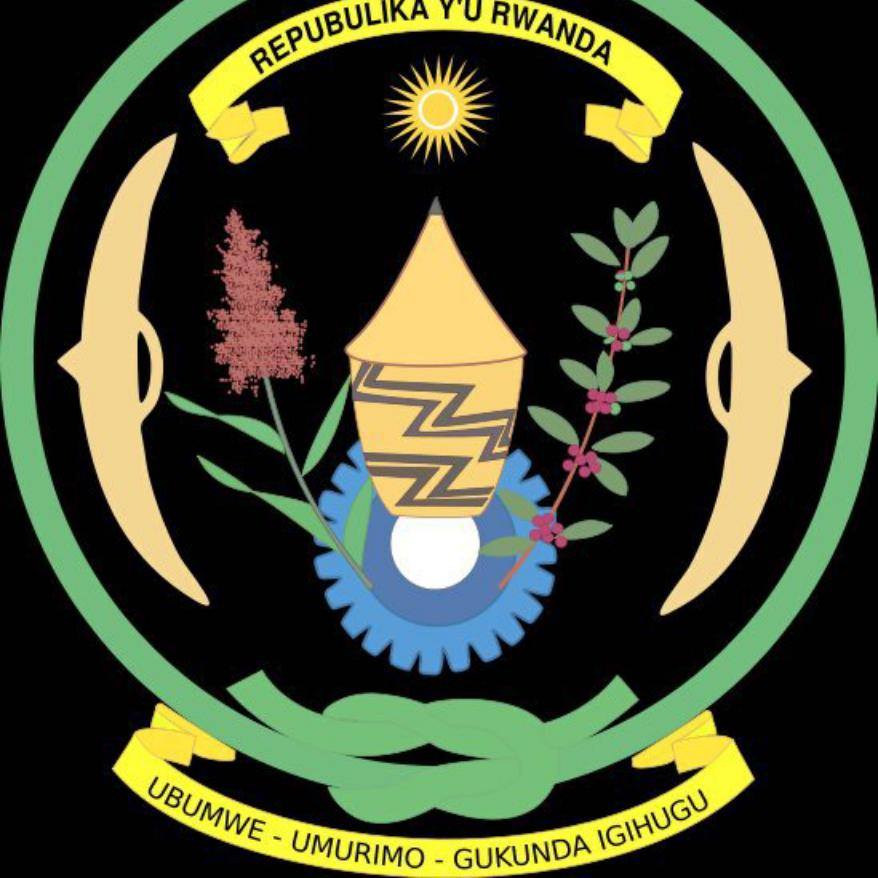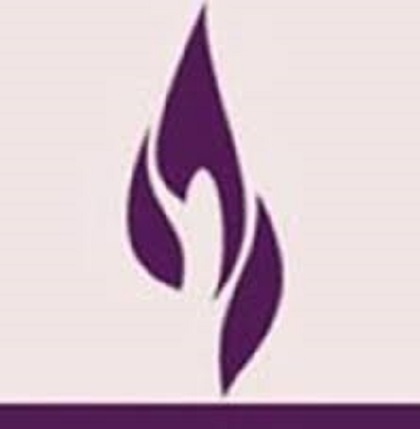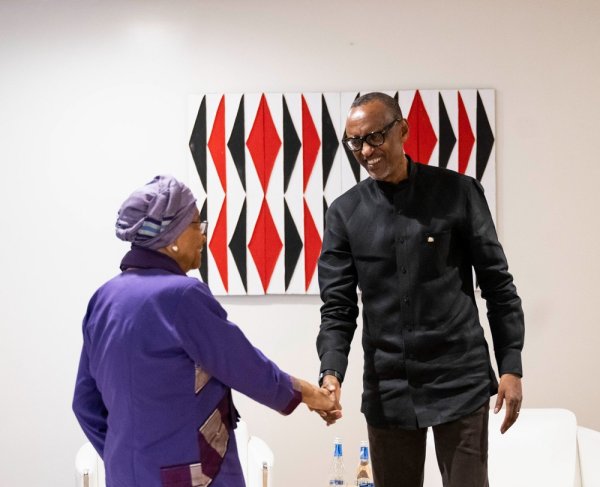 As the President of Rwanda whose economic and social progress is indisputable, Paul Kagame elaborates on his concept of good governance and democracy
As the President of Rwanda whose economic and social progress is indisputable, Paul Kagame elaborates on his concept of good governance and democracy
Power has not made Paul Kagame any heavier, literally and figuratively. One morning in the Eastern Province, a hundred kilometres from Kigali, in front of 50,000 people who descended from all the surrounding hills to attend his meeting, the President dressed in black jeans and blue shirt humbly listens to the voice of the people. Behind a microphone, a crowd of ordinary Rwandans form a procession to ask him questions: issues of cows, land, compensation, small conflicts with the administration, lyrical poems chanted in Kinyarwanda, poorly healed wounds of the genocide … Kagame responds when he does not call the Mayor, the deputy, Madame the Governor or the Minister concerned to answer in his place.
The latter do not seem at ease, as the boss demands that they be concise, clear and convincing. At 54, the man Time magazine ranks among the hundred most influential people in the world and that American universities are competing to invite for their inaugural lectures and whose only hobbies are sports and reading books on development economics, continues, twelve years after his accession to the presidency, to lead Rwanda Inc. as a mwalimu – a schoolmaster, in Swahili – leads a class where each student is seated in front of a computer. Here everything is calm, order, vigilance. No noisy music to be heard from ngandas as in neighbouring DR Congo, no screaming people drunk with beer or banana wine, everyone is at home, quiet and busy working to an unreasonable degree.
Under the guise of peace and a security that is ubiquitous, invisible and meticulously organised, the memory of the genocide is everywhere all the time. Often, the casual visitor feels crushed under the weight of the dead and the unspoken. The faces are serious and bursts of laughter rare. Rwanda is transforming the demons of the past into creative and productive energy. Judging by the rather brilliant socioeconomic outcomes, achieved by a country that has become a model in this field, it is poised to succeed. Western-style models will have to wait…
On July 1st, independent Rwanda turns 50. Is there something to celebrate?
It depends on what you mean by that. It’s our history, and we must own it, with its share of good parts and tragedies. It will be a day for reflection, not an occasion for festivities or uncontrolled public spending. I know elsewhere on the continent the fiftieth anniversary is often celebrated with pomp and rejoicing, but we do not feel obliged to do the same. In general, for obvious reasons of cost, this date is also joined to another very close one on July 4th, which marks the anniversary of Rwanda’s liberation from genocidal forces. This year, both events will be commemorated on July 1st, with sobriety. Especially since 1 July 1962 was not a day of joy for all Rwandans… Yes indeed. That day will therefore be placed in its historical moment, with no spirit of revenge.
It is also an opportunity to reflect on what democracy is in the Rwandan context. For you, obviously, the construction of a strong state, able to overcome community conflicts, takes priority over the Western-style model of democracy. Am I wrong?
Yes and no. Before being a concept applicable everywhere, democracy must first be a reality. It must come from the people, how they lead their daily life, in the way they manage and conduct their lives. Democracy is not an abstract theory; it is the product of a context. Look around you: there is no unique form of democracy but different democratic systems, ranging from constitutional monarchy to direct popular representation. Democracy must conform to the aspirations, to the history and culture of the people among whom it claims to take root; otherwise it is doomed to failure. This is what we’re trying to do in Rwanda. Rwanda is neither France nor Great Britain or Belgium. In Africa, democracy cannot be decreed, it has to be built, it has to be prepared…
Say that there is a universal model of democracy; let’s call it the Western model, if it suits you. After all, the aspirations of Rwandans are not, in terms of freedoms, representativeness and prosperity, different from those of other people. But a model is not the same as ready-to-wear. It must adapt to the wearer.
Again, we have our own history, our own traditions and a particular social organization that the tragedies of the last century, including the genocide, have harshly traumatized and abused. All these features bring about a rate of construction and democratic architecture of our own. Sometimes Rwandan society is described as a sheep-like, blind society, led with a whip by a leadership straight from 1984’s George Orwell. This is stupid. I am not a doctor issuing mandatory orders to the people on what to do or not do by holding them by the throat. Those outsiders who depict us as a kind of anthill with no brain do not respect us and do not deserve our respect. We are open to advice on democratic development, provided this is in good faith, but we do not like the prescriptions, let alone orders.
Rwanda is often criticized for the way the authority sees the role of the media. For you, do the media have to echo the collective achievements and mobilize public opinion in favour of the state, rather than educate people to think critically and independently? Are you afraid of freedom of the press?
Absolutely not. Just read some Rwandan newspapers in Kinyarwanda to realize how the image of a government muzzling the press is wrong. Criticism is frequent. Excess or even insults, are recurrent there. I told you that we did not like prescriptions: there are none here beyond the limits set by law common to all democracies, which penalizes defamation or genocide apology. Otherwise, my opinion on this subject differs from the one you attribute to me. I am convinced that media is a key institution for development, in that they help to go beyond the dogmas through debate and criticism. Everyone, be a Rwandan or a foreigner, is also free to start a newspaper, radio or TV here. The only constraints are those of the market.
That said, I’m not naive. As much as I am against the thought police and editorial censorship – and you’ll find books by genocide deniers on sale openly in Kigali bookstores – I am against this tendency of many media professionals to define in their own terms what to do or not do. Again, we do not like the prescriptions whatever their origin. It is not up to the media, much less when they are foreign, whose independence is also relative, to dictate us the way to go.
Your country is regularly praised for its respect of good governance. However, three generals and a colonel are now under judicial investigation for their alleged involvement in traffic of minerals from the DR Congo. Does this not give grounds to the NGOs that you accuse of participating in looting the wealth of your neighbour?
First of all, I do not have to justify myself, much less to respond to NGOs who would be better off examining their own conscience with regard to their role during and after the genocide. Secondly, this case demonstrates the opposite of what you are suggesting. It is precisely because we have zero tolerance when it comes to fighting against corruption, and because the Rwanda Defense Forces adhere to the most rigorous moral and professional standards in the world, that this investigation was opened. Finally, do not except me give detailed comments about a process that belongs only to the justice system.
Several leaders of the Rwandan opposition in exile, including your former director of cabinet Théogène Rudasingwa, but also former senior officials of the army, now refugees in South Africa, were leaders that were very close to you. How do you explain that they somehow betrayed you?
They have not betrayed me; they betrayed themselves and betrayed the people of Rwanda. In any case, if some of my colleagues are not up to the task of the mission with which they were entrusted, I shouldn’t be blamed for it. I trust, I delegate, but I demand accountability. I verify and sanction shortcomings. Some cannot tolerate this and choose to leave rather than face up to their responsibilities. It’s human nature… There’s no need to go into the criminal records of these people: it is public knowledge.
The violence in the arguments used against you is surprising. You are painted as a kind of monstrous Machiavelli, guilty not only of having ordered the assassination of two presidents – Habyarimana and Kabila – but also the extermination of the Tutsi of Rwanda to reach power. Why do you attract such hatred?
I believe only psychiatry would be of help to us in responding to your question. This is no longer in the domain of the rational. It is not in my area of expertise and I have neither the time nor the desire to enter into the subconscious of sick minds.
There was another grenade attack in Kigali in January. Who is responsible?
The investigation is ongoing. It has led, as in the previous acts of terrorism of this type, to the same network: a connection between the ex-generals in exile in South Africa and the genocidaires of the FDLR [Democratic Forces for the liberation of Rwanda] based in Eastern DRC.
This collaboration between Tutsi and Hutu opposition, as illustrated by the recent rapprochement in Brussels between the Rwandese National Congress and the United Democratic Forces of Victory Ingabire – still detained in Rwanda – does it worry you?
No. It is the sort of thing that happens between people who have no other stand apart from the desire for revenge. But they have absolutely no impact nor influence here.
The Tutsi militia chief, Bosco Ntaganda, who operates in North Kivu, a General in the Congolese army, has been under an International Criminal Tribunal (ICC) mandate for five years. Do you support his arrest?
This is a matter for the DRC and not Rwanda. Two things however: it is vital to take into account the continued volatile context of this region and to understand the potential impact of such an action on the security situation. It may be positive, but it could equally well be very negative, yet this evaluation still hasn’t been done. Second thing: my reservations about the functioning and impartiality of the ICC, that I have expressed repeatedly, remain intact.
How is your relationship with President Kabila?
Good. We communicate.
Why did you reject the new French Ambassador proposed by Paris?
Let’s not personalise issues. It is a decision of government, even though I have ultimate responsibility. On assessment, it appears there were certain details in the CV of the proposed individual that were not suitable. We therefore asked for another name to be proposed. It’s a normal procedure, quite routine.
It would seem that your response would be negative no matter the candidate proposed by Alain Juppé.
That is not correct. We are capable of making the distinction between France and its Minister of Foreign Affairs. Our wish to have a relationship of active cooperation and friendship with France remains unchanged.
But still, without an Ambassador, nothing moves. Do you think that if Francois Hollande is elected on 6 May, France and Rwanda will finally have a fresh start?
I don’t know Francois Hollande but I remain open to pursue dialogue with the head of state chosen by the French people – whoever that will be.
You were the only African to openly endorse the nomination of the American Jim Yong Kim to head the World Bank. Was the Nigerian candidate Ngozi Okonjo-Iweala not suitable? Let’s be precise. I welcomed Jim Yong Kim’s nomination by President Obamaand I congratulated him on his election. I happen to know Jim well and he had done remarkable work in Rwanda in the health sector – I wasn’t going to hide this fact or the admiration that I have for him. But it doesn’t mean that I don’t like Okonjo-Iweala, who I also know and who is also very qualified.
Do you find it normal that the World Bank is reserved for an American, the IMF for a European, and Africa is perpetually marginalized in all major international institutions?
No. But I also know that we live in the real world not one of our dreams. The observation you have just made is merely an expression of the balance of power that Africa will only achieve on one condition – that we show a united front. However, we cannot even agree on the position of the chairperson of the African Union Commission.
Who do you choose between Jean Ping and Nkosazana Dlamini-Zuma?
I’ll choose the candidate that Africa chooses
Is a coup d’état, like the one that happened in Mali, possible in Rwanda?
Mutinying soldiers leave their barracks to storm the Presidency? It’s a like a bad film, one that is impossible to produce here, based on the nature of the actors, the director and the audience. But what happened in Bamako is an example of what I just told you about democracy. Mali was a country with a reputation of democracy, even as such praised by the media and NGOs. However, just like building a house and forgetting the foundation, you cannot build democracy on sand.
Your compatriots shift between admiration and fear of you. Often both at once. Is this fear of you necessary to exercise power? Certainly not fear. Respect, yes, absolutely. But I strongly doubt that you have carried out a scientific survey to back up your assertion. Do it and you will see that in the judgment of Rwandans, the positive far outweighs what you assume to be fear.
I will not repeat the question on what you intend to do in 2017, at the end of your last mandate…
That’s good. I have already answered this a hundred times. So, if you don’t believe me, just wait and see.
A Putin-Medvedev scenario, where your successor plays the role of Medvedev, and you that of Putin, would this be science-fiction?
The fact that it has already happened in Russia proves that it is not science-fiction. But when it comes to Rwanda, it is, quite simply, fiction.
Source: Jeune Afrique
www.rwandagateway.org/spip.php?article1571
Posté par rwandaises.com




